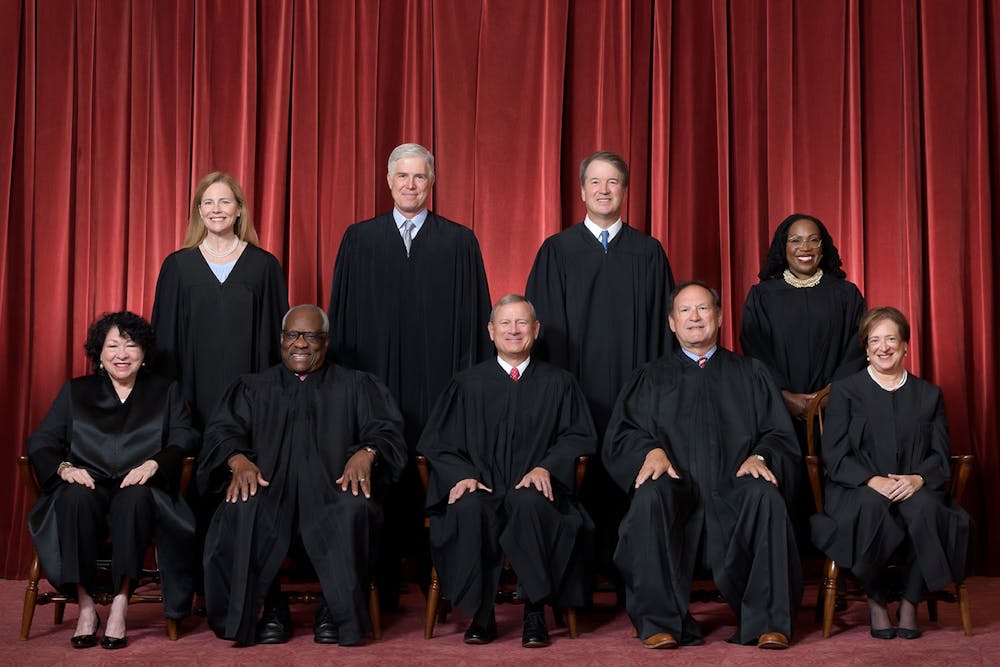By Gauri Patel
Staff Writer
The Supreme Court ruled that former president Donald Trump’s name cannot be removed from the ballot, reversing the Colorado Supreme Court decision which determined that Trump could not hold public office again over his actions leading up to the attack on the Capitol on Jan. 6, 2021, according to The Associated Press.
All nine justices unanimously agreed to overturn the Dec. 19 decision by Colorado’s top court, which ruled that Trump’s name should not appear on the state’s Republican primary ballot after concluding that Section 3 of the 14th Amendment disqualifies him from holding office. According to Reuters, the provision provides that no one can hold any civil or military office in the United States if that person had previously sworn to support the Constitution but then “engaged in insurrection or rebellion” against the federal government. The state court found that Trump took part in the insurrection by inciting and supporting his followers in the Capitol attack.
The Supreme Court decision, issued a day before Colorado and 14 other states held their Super Tuesday primary elections, found that the Colorado Supreme Court had wrongly assumed that states can determine whether a presidential candidate or other candidates for federal office are ineligible. The conservative majority went further to say that Section 3 can only be enforced against federal office-seekers through legislation by Congress.
By deciding the case based on the legal question of whether Congress or the states have the authority to enforce Section 3, the court avoided addressing the issue of determining whether Trump’s actions constituted an insurrection as a part of the Jan. 6 attack. In fact, according to The Associated Press, the ruling does not contain any reference to Jan. 6 and does not address whether Trump played a role in instigating the attack. Instead, it focuses on the legal, procedural question of whether Congress or the states get to decide an election challenge under the provision.
Although the decision was unanimous, there were some divisions as to how to resolve the case. The court’s three liberal justices, Sonia Sotomayor, Elena Kagan and Ketanji Brown Jackson, expressed in a jointly written, concurring opinion that the court had decided more than it needed to by laying out how Section 3 should be enforced by Congress, according to The Associated Press.
The three justices said the decision could "insulate" Trump from future controversy, according to The Associated Press, adding that the ruling "shuts the door on other potential means of federal enforcement" of Section 3 to prevent future insurrectionists from holding federal office.
Amy Coney Barrett, a conservative justice, also said she did not agree with the majority’s ruling that only Congress can enforce the provision through legislation but did not want to join the liberals’ opinion, instead emphasizing the justices’ unanimous decision on the case.
“...this is not the time to amplify disagreement with stridency,” Barrett wrote. “Particularly in this circumstance, writings on the Court should turn the national temperature down, not up. For present purposes, our differences are far less important than our unanimity: All nine Justices agree on the outcome of this case,” she concluded, according to The Associated Press. “That is the message Americans should take home.”
The ruling prevents the use of Section 3 against federal officials without action by Congress, but it allows states to use the provision against their own state officials. In 2022, a New Mexico court removed Couy Griffin from his county commission, issuing the first disqualification in over a century under the provision. Griffin was found guilty of trespassing on Capitol grounds during the Jan. 6 attack while leading a group known as "Cowboys for Trump,” according to The Associated Press.
This was the latest ruling in a series of legal cases in which Trump is involved, including one scheduled for later this month involving him allegedly paying hush money to an adult film actress and falsifying business records during his 2016 presidential campaign. He is also appealing a ruling on a case about fraud committed by his businesses that requires him to pay $355 million, and also a verdict on a defamation lawsuit filed by E. Jean Carroll that requires him to pay $83 million.
While Trump may have secured a win in this instance, his legal battles are far from over.







